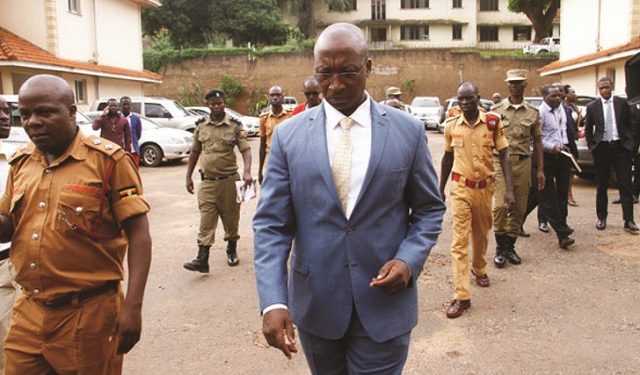Former State Minister for Labour Herbert Kabafunzaki has been convicted of corruption by the Anti-Corruption Court in Kampala.
Kabafunzaki, was ordered to pay a fine of 10 million or serve three years in prison, he was also barred from holding public office for a period of 10 years.
“It is ordered (Section 46 of the Anti-Corruption Act) that he is barred from holding a public office for a period of l0 years from today,” Justice Margaret Tibulya of the Anti-Corruption Court ruled.
Kabafuzaki who was arrested on April 8, 2017, at Kampala Serena Hotel for receiving a sh5 million bribe from AYA Investment boss, Mohammed Hamid, was charged with two counts of corruption contrary to section 2 (a) and 26 of the Anti-Corruption Act 2009 and one count of conspiracy contrary to section 390 of the penal code Act.
He was jointly charged with two others, who include Brian Mugabo, his political assistant, and Bruce Lubowa, an interior designer in Wakiso District.
On Friday, Justice Tibulya ruled that the evidence available clearly linked the minister to the crime.
“The above evidence squarely places the accused to the scene of the crime for purposes of committing the alleged offences, and corroborates that of Pw3(Serena hotel financial controller) that he handed over the shs5 million to the accused. In agreement with the gentlemen assessors I find that the accused directly received shs5 million as alleged in count two,” Justice Tibulya said.
The judge added, “Mohammed Mohammed Hamid’s evidence that the accused and his agents informed him that the money was the cost for clearing his name of sexual harassment allegations was not disputed,”
“It is common knowledge that one of the accused’s roles as Minister in charge of labour was to ensure that there were harmonious labour relations in the country. That he solicited for and received money in order for him to clear Pw3’s name can only mean that the money was in exchange for an act in the performance of his public functions, and I so find.”
Justice Tibulya agreed with the gentlemen assessors that the prosecution adduced sufficient evidence to support the charges in each count.
“I convict the accused of corruption as charged in each count,” she ruled.











